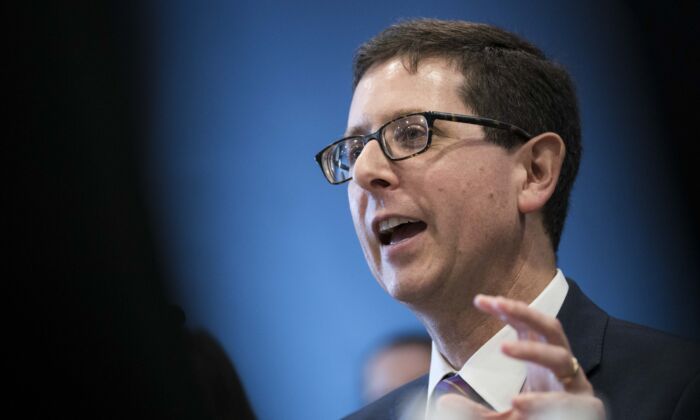


A stagnant economy, rising unemployment, higher interest rates, and burgeoning federal debt add up to a problem that must be addressed, according to Phillip Swagel, director of the Congressional Budget Office (CBO).
Swagel provided his assessment at the release of two reports, “The Budget and Economic Outlook: 2023 to 2033” and “Federal Debt and the Statutory Limit, February 2023,” on Feb. 15.
“Our projections suggest the changes in fiscal policy must be made to address the rising costs of interest and mitigate other adverse consequences of high and rising debt,” Swagel said during a live-streamed press conference.
While the projections for 2023 are sobering, Swagel refused to predict a recession, saying the economic indicators were mixed. For example, some spending indicators have slowed but consumer spending remains strong.
Overall, the reports showed a stagnant economy in the short term and an escalating national debt for a decade to come.
The current Budget and Economic Outlook report predicted both slower-than-expected economic growth and an increase in deficit spending.
Economic output will stagnate in 2023 as unemployment rises, according to the CBO. That makes for a bleak jobs forecast, said Peter C. Earle, an economist at the American Institute for Economic Research.
“The CBO report projects that U.S. unemployment would rise to 5.1 percent this year, up from 3.6 percent currently. If accurate, that’s a loss of 2.5 million jobs,” Earle told The Epoch Times.
At the same time, deficit spending is growing beyond previous forecasts. The deficit for 2023 will be $1.4 trillion, $400 billion more than the CBO predicted it would be nine months ago.
The projected deficit over the next 10 years is higher as well, $3.1 trillion more than previously predicted, an increase of about 20 percent.
The nation’s budget deficit is calculated in two ways: actual dollars and as a percentage of the country’s gross domestic product (GDP).
The CBO predicts an increased deficit by both measures.
That annual deficit will grow to $2.7 trillion over the next 10 years, the CBO estimates, and rise to 6.9 percent of GDP.
One bit of good news is that inflation is projected to ease next year, falling to 4.8 percent. Yet even that is two-and-a-half times higher than inflation has averaged for decades, Earle noted.
That increasing deficit is largely attributable to recent legislation, high inflation, and rising interest rates, according to the CBO.
Recent spending bills include the CHIPS and Science Act of 2022, which allotted $52 billion for scientific research projects aimed at strengthening high-tech manufacturing in the United States.
The Inflation Reduction Act of 2022 provided $738 billion to reduce the deficit, lower prescription drug costs, and increase domestic production of clean energy.
The assessment came as no surprise to EJ Antoni, a research fellow at The Heritage Foundation.
“The CBO’s estimates largely confirm what we already knew, namely, that the Treasury will be unable to pay all its bills beginning in the late summer of this year,” Antoni told The Epoch Times.
“This has not resulted because of a lack of revenue—tax revenue has never been higher, whether measured in nominal terms, inflation-adjusted terms, or as a percentage of income, or as a share of the economy. The problem is too much spending for too long.”
Ongoing deficit spending has rapidly increased the national debt.
The debt ceiling is the maximum amount of debt Congress has authorized the government to hold at any one time.
The current debt ceiling is $31.4 million, which would have been reached in January if not for “extraordinary measures” taken by the U.S. Treasury. The CBO now projects that those extraordinary measures should keep the government functioning without borrowing money until sometime between July and September.
The timing is uncertain because some revenues and payments could be different from what was projected. For example, April tax receipts could be higher or lower than previously estimated.
House Speaker Kevin McCarthy (R-Calif.) and President Joe Biden are in negotiations over raising the debt ceiling. McCarthy has said any increase will have to be accompanied by an agreement to cut what he calls “runaway spending” in the future.
Biden has said he will not agree to pre-conditions for raising the debt ceiling, which he says represents the full faith and credit of the United States.
If no agreement is reached before the extraordinary measures are exhausted, the government will have to delay paying at least some of its obligations.
Some payments that could be affected are Social Security benefits, which total about $100 billion each month, and Medicare Advantage health plans and Medicare Part D prescription drug plans, which total $40 billion a month.
Republicans have said they will not attack Medicare or Social Security benefits in negotiations over the debt ceiling. Yet others see no way to address deficit spending without dealing with those programs, which account for about 30 percent of the national budget.
“Two of the biggest drivers of mounting U.S. government spending are also the two that are the most dangerous for politicians to discuss: Social Security and Medicare,” Earle said.
“A time will come—if not now, then soon—where government officials will no longer be able to kick the can into the future.”
Swagel also stressed the need to address the problem of deficit spending. “We wouldn’t say to the Congress do this or do that. We just provide analysis,” he said, referring to the CBO.
“But at some point, something has to give.”


